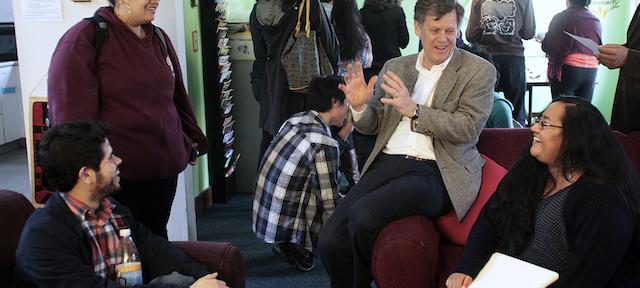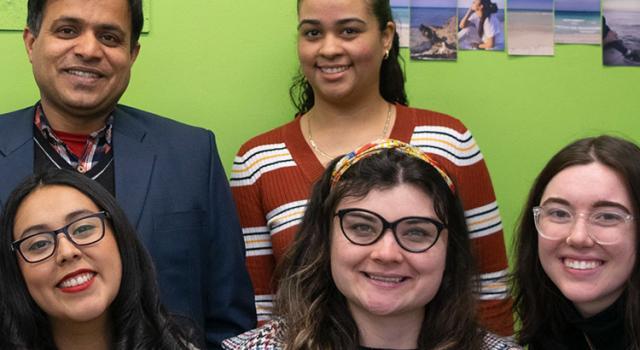When Students Stop and Think About What They're Learning

I remember all-nighters in college, staying awake on stimulants so I could cram for an exam. The next day, my mind foggy with relief and exhaustion, whatever “knowledge” I had crammed in slipped swiftly away. These memories come with regret and embarrassment: It was my fault for procrastinating, but it was also a poor model for learning.
Now, for my sins, I’m president of a college that requires students to write reflective evaluations of their own work as they complete each course, internship, independent study, and retrospective portfolios after each phase of their studies. The theory behind this practice isn’t new; last century, John Dewey advocated for reflection on one’s learning, writing in Experience and Education, “‘Stop and think’ is sound psychology.”
A hundred years later, Dewey’s theory is supported by a lot of data. A stream of recent research confirms the value of goal setting and self-evaluation in learning, including a qualitative study by our staff researchers here at Hampshire, who analyzed our longstanding practice of requiring students to write self-evaluations, and found the benefits to be measurable and significant.
Learners learn better if they stop and think.
Last summer, researchers at Harvard, University of North Carolina, and HEC Paris published findings of field and lab experiments in “Making Experience Count: The Role of Reflection in Individual Learning.” They report, “Individuals who are given time to articulate and codify their experience with a task, improve their performance significantly more than those who are given the same amount of time to accumulate additional experience with the task.”
The year before, researchers at the Universities of Loughborough (UK), Toronto, and Maryland published a qualitative study of students who kept diaries. Among the findings in “Self-reflection, growth goals, and academic outcomes”: students reflecting on their studies and setting goals had a positive impact on their academic performance.
Selen Turkay of the Harvard Initiative for Learning and Teaching wrote in 2014 in “Setting Goals: Who, How Why?” that students who pursue goals improve their learning, citing compelling studies. That same year, scientists from Tel Aviv and Ghent Universities, writing in Current Directions in Psychological Science, said they found that “systematic reflection stands out as a prominent tool for learning from experience.”
Studies of student performance published in 2011 in Advances in Health Sciences Education and 2010 in Journal of Applied Psychology demonstrated positive results of self-reflection and goal-setting.
Recently, our staff researchers here at Hampshire led a qualitative study of our practice of asking students to write self-evaluations. The leaders of our partner colleges who founded Hampshire in the 1960s believed that reflection helps students develop the capacity to think and learn for themselves, a departure from the traditional model of being lectured at and tested.
For our study, the Hampshire Learning Project interviewed a large number of our students and recent graduates. Our research found the benefits to our students to be measurable and significant, and affirmed that self-reflection improved and deepened learning both at the course level and year to year.
Writing effective self-evaluations takes guidance from teachers, and takes practice — it’s a learned skill. As a resource for faculty, our Center for Teaching and Learning has documented best practices and published guidelines, recommending that professors advise students to consider the goals of a course as written in the syllabus, and reflect on how they performed by answering questions such as:
- What were you supposed to do in the course?
- How well did you complete each component?
- What did you learn from it?
- In what ways have you struggled to make progress and why?
- What is your plan for improving?
- What were your goals coming into this course? Did you achieve them?
- What has been most helpful and least helpful to your learning?
- Has the course transformed your thinking, abilities, or goals?
We ask students not only to reflect but also to project, making a plan to achieve their goals. For instance, we ask each student to write a contract at the beginning of their second year describing their goals for the next two years. They then work with their faculty committee to craft a plan to meet those goals. The contract is a working document; the student can revise it as they progress.
Students told our researchers they came to value the contract – it pushed them to clarify their focus and make a plan – and also appreciated its simultaneous qualities of flexibility and accountability: It can change, but it also holds the student responsible.
One student response was representative: “My [retrospective essay] was a very hard self-evaluation, my adviser had me go through multiple drafts and it’s 12 or 14 pages. And it was really intense but also really awesome, because afterwards I was thinking about my process and my growth, how I’ve changed as a writer and why I changed. And now I understand so much more about how I get my best work done.”
At its best, education helps students find meaning in society and in self. To cite last century’s educator and political scientist John Gaus, “intelligence must record itself in action.” Education should help students develop internal will, confidence, and strength, so they may accept responsibility for shaping their communities and world. Self-awareness and self-development are central to this, and, just as important – these practices improve the depth and durability of learning.
First Published on HuffPost.



